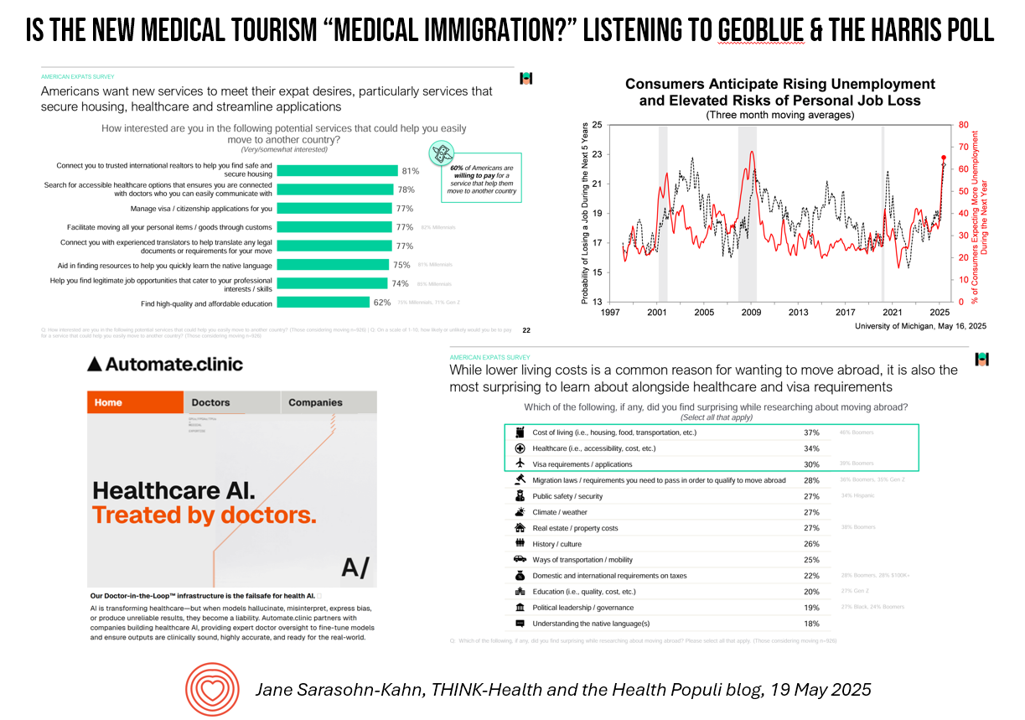One in three Americans could imagine leaving America for good as expatriates — with access to affordable and reliable health insurance the top consideration, according to research conducted by the Harris Poll on behalf of GeoBlue and International Citizens Insurance (ICI).
“Thirty-one percent of potential expats cite concerns about healthcare coverage abroad being the reason they haven’t yet taken the leap to move abroad. This trumped concerns about their work and social life abroad,” the survey found.

Earlier this year, The Harris Poll’s American Expats Survey, published in February 2025, found that health care accessibility and cost are important reasons for potential U.S. expats to move abroad, coupled with lower costs of living and then visa requirements (that is, less onerous for citizenship application and approval). The second chart comes out of Harris’s American Expats survey, bolstering the GeoBlue/ICI findings.

A few data points shape the context and motivation for medical immigration.
First, the May 2025 University of Michigan Survey of Consumer Sentiment quantified that U.S. consumers’ financial feelings were down nearly 30% since January 2025. This spike up is clearly illustrated in the zig-zagging line chart from U-Michigan’s monthly study. Peoples’ current assessments of personal finances fell on the basis of weakening incomes; “tariffs” were also mentioned by nearly three-quarters of consumers, up from almost 60% in April. Bottom-line: uncertainty over U.S. trade policy dominates Americans’ economic perspectives.
Furthermore, side hustles are “the new second-shift,” PYMNTS journal has been covering for the past year. A second-income has become necessary in a lower-wage and job-insecure environment that many U.S. workers face. The U.S. is a “side hustle nation,” PYMNTS further opined in another column, citing U.S. Census data that two in five American consumers now earn extra money through side hustles, a core personal finance strategy.

Third, from the Harris Expats study, Americans increasingly feel “stuck” in survival mode — as Harris observed, “The American Dream (is) slipping further out of reach.”
What’s new-er about this data finding is that expatriation out of the U.S. was more likely to be seen among older Americans seeking warmer climates and lower costs-of-living (indeed, including health care) in places like southern Europe (e.g., Portugal, Spain, Greece, Mexico and various Caribbean geographies).
With the growth of being able to live a digital nomadic life (that is, have WiFi and laptop, will and can travel and work remotely), younger people feel more empowered to move abroad, as this slide from Harris’s Expats survey revealed.

Further supporting health consumers’ ability to self-care and receive care remotely and on-the-move, growing access to telehealth, remote health monitoring, and wearable tech can enable a person to gather data and share with providers and health coaches who are not located in-country or -community. The growing adoption of AI in primary care, too (such as Dr. Jay Parkinson’s start-up Automate.clinic bringing human provider-capital to collaborate with AI-based health IT) could be another platform and on-ramp to receiving and collaborating for care as an expat with business models adapting to this new reality of the “medical home,” abroad and virtual.
Some context about the GeoBlue/ICI study: GeoBlue is a shared organization owned and supported by 15 Blue Cross Blue Shield companies and Bupa, the UK-based global health company. GeoBlue covers international health insurance programs and is a licensee of BCBS Association — so is in the business of providing health insurance for patients and health citizens outside of the U.S. (whom GeoBlue coins as “the globally mobile”).

Health Populi’s Hot Points: This last chart comes out of the Harris American Expats study, illustrating what services U.S. health citizens looking globally could demand for helping smooth their on-ramp toward moving and living abroad.
Of high value would be,
- Realtors to help identify housing
- Finding accessible health care and providers who could deliver high-levels of service (esp. communication)
- Managing the visa/citizenship application process
- Facilitating the physical move of personal items and goods through Customs
- Translation services and language learning (for legal and work)
- Support to find job opportunities that would leverage personal skills.
Watch this space as “medical tourism” will morph into “medical immigration” for some digital nomads and people seeking affordable life- and health-styles — beyond Boomers and people aging into Medicare and Social Security.




